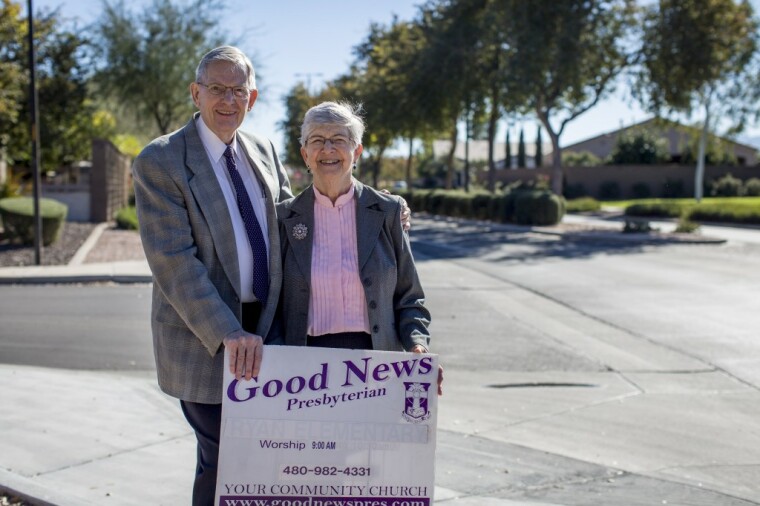Good sign: Pastor wins free speech case at Supreme Court

WASHINGTON, D.C. (Christian Examiner) – The Supreme Court on June 18 issued a unanimous verdict in favor of an 82-year-old Arizona pastor who was told by his town he had to adhere to stringent rules and time limitations for posting signs advertising church services.
The town of Gilbert, Arizona, according to the Court, had established a strict sign code but set in place different requirements for some signs, such as those with political advertisements, than others – namely those advertising events or services.
Under the town's sign code pastor Clyde Reed was only allowed to post temporary directional signs for Good News Presbyterian Church for less than 12 hours.
This whole experience has been shocking to me – our signs inviting people to church are very important yet are treated as second-class speech. We aren't asking for special treatment; we just want our town to stop favoring the speech of others over ours.
Reed believed the limitations violated his free speech rights because they prevented him from promoting his church. He and church volunteers were forced to post the signs in the dark, near midnight, and then remove the signs immediately after church services in order to let people know where worship services were available.
Writing for the high court, Justice Clarence Thomas noted, "The Code imposes more stringent restrictions on these signs than it does on signs conveying other messages. We hold that these provisions are content-based regulations of speech that cannot survive strict scrutiny."
"Strict scrutiny" means the government cannot demonstrate a compelling interest, such as public safety, for restricting the place and manner of speech.
Thomas said in the ruling the signs were a cheap and effective way for the "cash strapped" church to advertise its services, and church members had put the signs up early Saturday and then removed them after services on Sunday.
That practice, however, caught the attention of the town's sign code compliance officer, who twice cited the church for violating the town's rules. The first citation was for exceeding the time limits for event signage. The second citation was for the same, but in that incident the city also confiscated the signage. The pastor was forced to go to city offices and retrieve the sign.
For Thomas and the Court, however, there is no difference in a sign conveying political content and one that has content related to the time and place of a meeting, such as directions to a church that does not have its own building and must meet in multiple locations.
"If a sign informs its reader of the time and place a book club will discuss John Locke's Two Treatises of Government, that sign will be treated differently from a sign expressing the view that one should vote for one of Locke's followers in an upcoming election, and both signs will be treated differently from a sign expressing an ideological view rooted in Locke's theory of government. More to the point, the Church's signs inviting people to attend its worship services are treated differently from signs conveying other types of ideas. On its face, the Sign Code is a content-based regulation of speech," Thomas wrote.
Reed said after the case reached the Supreme Court that he never expected for the case to make it that far, and that it should not have been necessary in the first place.
"This whole experience has been shocking to me – our signs inviting people to church are very important yet are treated as second-class speech. We aren't asking for special treatment; we just want our town to stop favoring the speech of others over ours," Reed told Alliance Defending Freedom (ADF), the organization representing him and his church.
ADF's senior counsel, David Cortman, praised the Supreme Court for its ruling in a statement citing its "long history of ensuring that the government treats all speech in a content-neutral manner."
"Speech discrimination is wrong regardless of whether the government intended to violate the First Amendment of not, and it doesn't matter if the government thinks its discrimination was well-intended. It's still government playing favorites, and that's unconstitutional, as the Supreme Court today found," Cortman said.